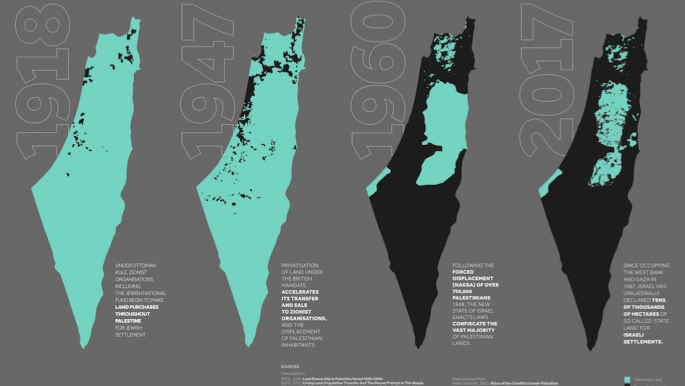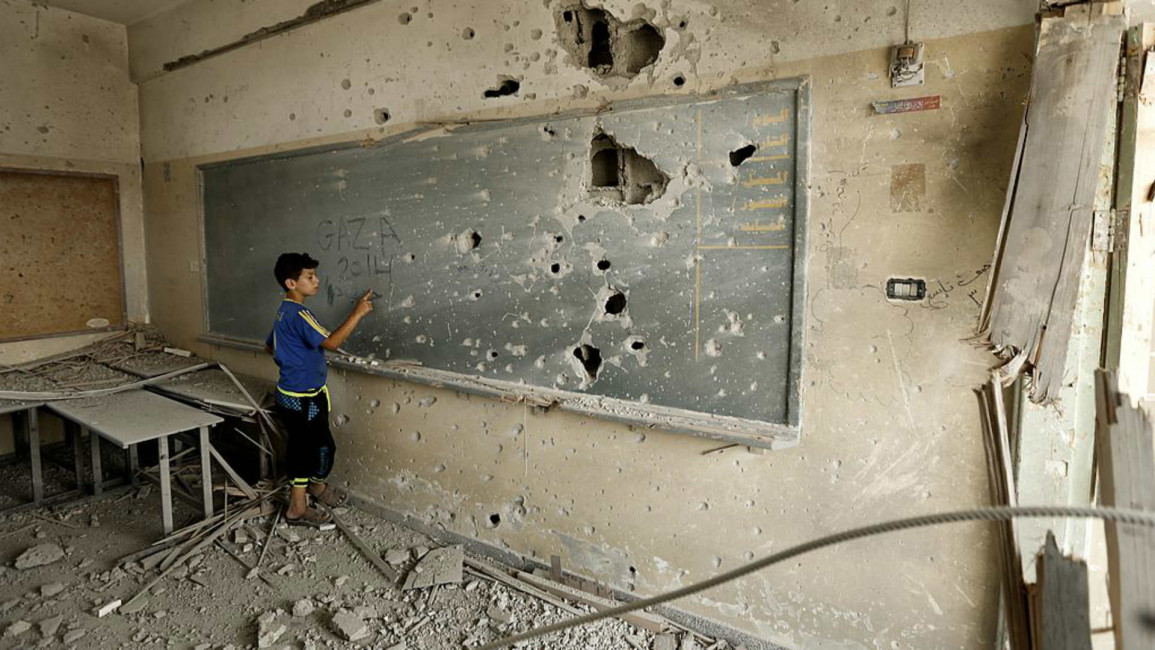
The UN is failing Palestine's schoolchildren
What happens to upholding education as a basic human right, when Israel's bombing of Gaza becomes a normalised routine, you might ask?
In November 2018, Israeli airstrikes on Gaza targeted Palestinian schools, as well as a kindergarten and a learning support centre. At the time - also within the context of Israeli forces disrupting education in the occupied West Bank, and schools being slated for demolition - the UN's Humanitarian Coordinator Jamie McGoldrick stated, "The classroom should be a sanctuary from conflict, where children can learn and develop as citizens."
However, in its most recent two-day aggression against Gaza, Israel damaged 13 Palestinian schools.
According to the Palestinian Education Ministry, windows and doors were damaged when classrooms were hit by shrapnel from Israeli weapons. The silence emanating from the UN is telling of an international community which has blatantly defaulted.
During Operation Protective Edge in 2014, which lasted 50 days, Israel destroyed 26 schools and damaged 122 others, among them 75 UNRWA education premises. Kindergarten schools in Gaza were also targeted: Out of 407, 11 schools were destroyed by Israel and another 133 were damaged.
In addition, students accounted for 27.4 percent of the total death toll from Israeli airstrikes. These statistics were compiled by UNESCO and published in 2015. And although the report details recommendations for "protecting education from attack," it fails to assert Israel's culpability and accountability.
 |
From measured criticism, the UN has degenerated into a complicit silence |  |
Also in 2014, Israel was mostly condemned for shelling UN schools, rather than for targeting Gaza's education sector. The "criminal act", as referred to by former UN Secretary-General Ban Ki-Moon, only received considerable media attention due to the school's affiliation and its facilities being used as temporary refuge for displaced Palestinians. The wider context; a systematic targeting of education premises which disrupted Palestinian education in Gaza, was omitted.
The UN had also accused Israel of intentionally targeting one of their schools during Operation Cast Lead in 2008-2009 but refused to pursue the matter legally, stating that the board of inquiry "does not make legal findings and does not consider questions of legal liability".
Media scrutiny in earlier years, despite mainstream bias in favour of Israel, made it impossible to ignore the destruction wrought by the Israeli military in Gaza. At the very least, it was expected that the UN, in its role as alleged protector of human rights, would speak out on Israel's targeting of Palestinian schools. However, UN statements lacked the intent to hold Israel accountable.
 |
|
| [Click to enlarge] |
Now that Israel has clearly changed its tactics from large scale aggressions to routine airstrikes, the international community has also altered its response. From measured criticism, the UN has degenerated into a complicit silence. The destruction of 13 Palestinian schools has not been deemed worthy of acknowledgement, let alone a collective effort to hold Israel accountable.
The UN has, even during the earlier Israeli onslaughts on Gaza, sought to uphold Israel's security narrative by not exceeding routine inquiries. Prolonged bombing of the enclave usually resulted in two parallel responses - upholding Israel's alleged right to defend itself despite being the aggressor, and speaking about Palestinians from a human rights perspective, lest the UN validate Palestinian political demands.
 |
The UN has, even during the earlier Israeli onslaughts on Gaza, sought to uphold Israel's security narrative |  |
Such duplicity now seems no longer necessary. Israel's greatest achievement, to the detriment of Palestinians in Gaza, has been to normalise the bombing and its repercussions.
The UN has followed suit, blaming rocket fire from Gaza as seen in several statements by UN officials. Having absolved Israel of bombing Gaza, the UN will definitely not be issuing any statements deploring the destruction of educational premises.
Hamas has expressed "shock" at the UN omitting the context for the rocket fire from Gaza, as well as the organisation's refusal to comment about Israel's two-day aerial bombardment.
Yet, there are precedents to this new impunity.
Since 1948 it has been possible to see how Israel orchestrated its occupation of Palestine through a series of violations which the international community singles out as individual acts. By refusing to consider Israel's collective actions as leading to the oppression of a people, the UN has normalised its violations of international humanitarian law.
Read more: Israel leads in global attacks on medical facilities, workers - with Syria just behind
If the UN has failed to take action when it comes to Israel's policies that constitute ethnic cleansing, it is even easier for it to ignore violations of Article 26 of the Universal Declaration of Human Rights, which stipulates the right to education.
For Palestinians, education is the only remaining possibility that can contribute towards their independence and self-determination.
Israel and the UN are aware of this fact, and efforts to sabotage education have been ongoing. From impositions on the Palestinian curriculum and the targeting of schools in the occupied West Bank, to outright destruction of education premises in Gaza, Palestinian education suffers from constant interruption enforced by Israel.
The international community, on the other hand, has repeatedly associated education with humanitarian needs, as opposed to encouraging its political aspect.
 |
At the very least, it was expected that the UN, in its role as alleged protector of human rights, would speak out on Israel's targeting of Palestinian schools |  |
Arguable, the UN participates in calculated violence against Palestinians even when it comes to education, for it is in agreement with Israel regarding the normalisation of violence, including airstrikes on a besieged population.
Furthermore, the UN's international refusal to comment upon Israel's recent destruction of Palestinian schools shows that the organisation has no qualms about abusing its own definitions of rights, be they political, humanitarian, or both.
Futhermore, it appears the UN only considers the targeting of schools problematic when they pertain to its own organisation. Which means that, rather than speaking about Israel eliminating Palestinians' right to education, the UN is concerned with damages it incurs.
With the wrong message endorsed internationally - that damage to UN premises is more important than the ramifications upon Palestinians in Gaza - what is there to sustain the truth that education is imperative for Palestinians?
The UN has absconded, turning against its own charter, thus leaving Palestinians to face their anti-colonial struggle in isolation.
Ramona Wadi is an independent researcher, freelance journalist, book reviewer and blogger specialising in the struggle for memory in Chile and Palestine, colonial violence and the manipulation of international law.
Follow her on Twitter: @walzerscent
Opinions expressed in this article remain those of the author and do not necessarily represent those of The New Arab, its editorial board or staff.




